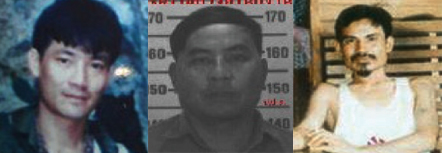Three well-known Burmese who have been put on a price by Thailand’s anti-drug operations center on Friday, 20 April, still see no reason to be concerned and are moving freely as they used to, according to sources from the Thai-Burmese border.
The three are:
Naw Kham, 43, known as the Godfather of the Golden Triangle, 2,000,000 baht ($ 66,666)
Yishay, 66, aka Chaiwat Pornsakulpaisarn, leader of Nampong People’s Militia Force (PMF), Tachilek township, 1,000,000 baht ($ 33,333)
Nakhanmwe aka Saw La Bwe, leader of the Democratic Karen Buddhist Army, now renamed Democratic Karen Benevolent Army (DKBA), that signed a ceasefire agreement with Naypyitaw on 3 November 2011
Bangkok Post reported on 21 April quoted Deputy Prime Minister Chalerm Yubamroong, who supervises anti-narcotic affairs, saying that the Thai government had sent officers to countries from where drugs are trafficked to Thailand. The report did not elaborate on it.

“Except for Naw Kham, who has been on the Burmese government’s wanted list since 2006, the two others are still seen in public, according to reports from Tachilek and Maesot.
“The announcement has immediate effect on Nakhanmwe,” said a senior Thai security officer. “He used to visit Thailand before this. Now he can no longer do that.”
However, there are also questions too.
“What about the Lao-bans (financiers) from Thailand who are helping us set up refineries and maintain them? Will there be prices on their heads?” a businessman known to be engaged in shady businesses asked. “What about the government officials, both here (in Burma) and Thailand, who see to it that both the raw materials and the drugs reach their destinations safe and sound? Aren’t they (the Thai government) going to do anything about them?”
According to sources in Shan State East, most of the financiers are ethnic Chinese from Thailand, Laos, China, Taiwan and Burma, “especially from Thailand.” Caffeine, used for manufacturing yaba, and implements also come from Thailand. “Most of all, without the Thai officials, we will never know how we can move the goods from the border to Bangkok,” said a member of one of PMFs in Tachilek.
Opium output this year also surpassed that of last year in all three parts of Shan State, all sources agree, despite the publicized destruction campaign in Hopong and Loilem townships. Out of 55 townships there, only 6 townships are reported to be poppy-free: Laogai (in Kokang); Mongmai, Pangwai, Napharn and Panghsang (in Wa); and Mongla.
Burma’s 15 year master plan to eradicate drugs is due to end in 2014.


